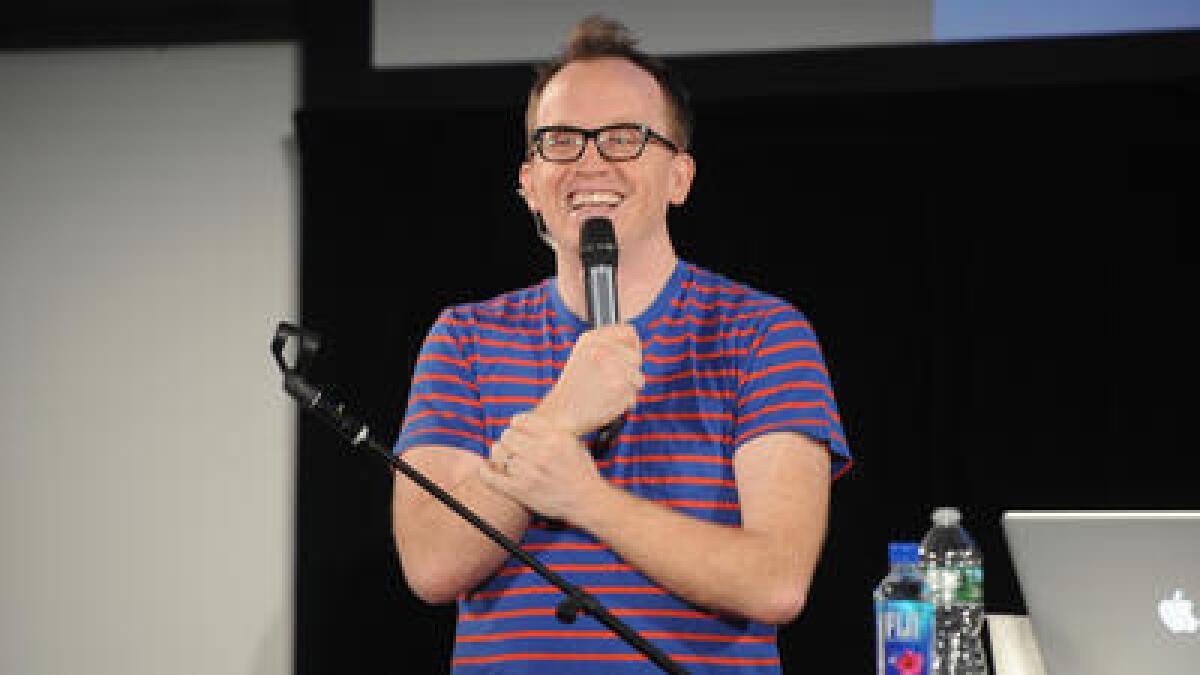Critic’s Choice: Streaming picks: ‘Beautiful Stories from Anonymous People,’ ‘Capital’

“Beautiful Stories from Anonymous People” (Earwolf podcast); “The Chris Gethard Show” (Fusion, YouTube). Chris Gethard — whose self-titled talk show, to describe it reductively, recently finished a second, and one hopes not final, season on Fusion — is also the host of an ongoing podcast. “Beautiful Stories from Anonymous People,” launched in March, and it has already acquired the shorthand title “Beautiful/Anonymous” and been featured on an episode of “This American Life.”
The setup is simple. Gethard speaks with an anonymous caller — the number is posted on social media — for as long as an hour. By the self-imposed rules of the game, Gethard cannot end the call early, but the caller can. This does happen in one episode; calls have also run a little long. A dozen or so self-selected interlocutors phoned in before the show was ever broadcast; callers now know what they’re getting into, though what they’re getting into changes according to what they bring to the table. And Gethard, who is arguably best known as Ilana Glazer’s exasperated boss on “Broad City,” has been taking calls for a long time — on his Fusion show and the New York public access cable show, based on a live show at the New York Upright Citizens Brigade that ran for four years before it.
Communication is the core and the point of his comedy.
That the calls last an hour is not unusual for a podcast, but that the host has no foreknowledge of the subject or the subjects the subject might want to discuss is different. It is less like an interview than a blind date in which the partners might run eagerly over discovered common ground or strive to keep the conversation afloat. And like a date, it can be more or less productive, though none I’ve heard has been less than interesting, even when nothing particularly deep or dramatic is being discussed. It does get deep and dramatic: One caller had discovered she’d been married to a child molester for 10 years; a conversation with a night nurse was largely about death.
See the most-read stories in Entertainment this hour »
There are as many reasons to eavesdrop as there are eavesdroppers in the world —– “Hello, audio voyeurs” is Gethard’s greeting at the top of one show — but it seems to me that what makes these shows exciting is not the strangeness of strangers’ lives but their familiarity; they let the humans out.
Gethard stays encouraging. “I don’t want to be judgmental” and “I say this with love” and “I don’t want to be facetious” are things he says a lot. (“Facilitate” is a favorite word.) Fulsome not quite to a fault, he is quick to praise his callers for their humanity or bravery or rad chillness. (“Wow” is another favorite word.) I don’t think he’s insincere; if anything, fans of the ironic mode will find him too sincere.
In the earliest episodes, he tended to take the show’s therapeutic vibe too much to heart; “I feel some responsibility to affect permanent change via this phone call,” he told one caller who was sick of his job and wanted to try comedy — the one thing the callers have in common, not surprisingly, is an interest in comedy.”
On a later show, he owned that his psychiatrist, who had listened to some episodes, told him, “The ones where you just hear people out are really good, and the ones where you offer advice on how people can fix their lives, one of them actually gave me hives, because you don’t know what you’re talking about and you can’t try to fix people.”
He also had a tendency early on to interrupt, or otherwise dominate the conversation. Listeners let him know this, and he let them know that he heard them. He leans back more now, chatters less.
Both seasons of “The Chris Gethard Show” are now online, along with episodes of his cable access series, and they’re worth looking up; they are ambitious in a way all their own. As in “Beautiful/Anonymous,” Gethard is out to change the world of whoever’s tuned in. With his Ed Grimley hair and Clark Kent glasses, Gethard is a talk show host in the way that Scott Pilgrim is a superhero, a Mister Rogers for millennials, pitched to outsiders, underdogs and weirdos. At 36, which puts him just out of, or barely inside of, that demographic, he considers himself the old guy in the room.
The series — which includes, along with co-host Shannon O’Neill and communications facilitator Bethany Hall, characters including the Human Fish and Gethard’s nemesis Vacation Jason — is a mix of skits and bits of the sketched out and the unforeseeable. It has a sweet party vibe — the audience surrounds the action — and a dark, good heart.
One of [the episodes] actually gave me hives, because you don’t know what you’re talking about.
— Chris Gethard’s psychiatrist on the “Beautiful/Anonymous” podcast
The second season ended with a wrestling match that found Gethard “erased from existence” and featured, professional wrestlers and Jon Hamm in a sumo suit. There was no announcement of a Season 3. Earlier episodes this year, each with a theme or formally experimental notion, included an “Under the Sea Gender Fluid Poly-Prom,” with Lena Dunham dressed as mermaid; a mental health episode with fellow taker of medication Maria Bamford (O’Neill: “I think it’s impossible to live a life without going somewhere dark, because life is just ...” Bamford: “Horrifying”); and a family dinner with Jerrod Carmichael. “I didn’t realize it got so heavy on ‘The Chris Gethard Show,’” Carmichael said after something heavy. “We go there, man,” Gethard replied.
“Capital” (Pivot, Monday through Thursday). A miniseries adapted by Peter Bowker (“Blackpool,” the soon-to-arrive “The A Word”) from John Lanchester’s 2012 novel, “Capital” is set on a street in a South London district to which change has been and will be coming. The title, I suppose, refers both to its geographical setting and to wealth — specifically to the rapidly rising property values, shown in cartoon inserts that also mark the passing months, and make an old neighborhood attractive to new residents with money as well as a tenuous foothold for longtime ones with less. In addition to novel-writing, Lanchester is a journalist with a specialty in finance.
One is reminded fleetingly of such nobly intentioned race-and-class films as Lawrence Kasdan’s “Grand Canyon” and Paul Haggis’ “Crash” (also a TV series). Living or working on Pepys Road: a white British banker (Toby Jones), his spendthrift wife (Rachael Stirling) and their children, representing the well-heeled new guard; Gemma Jones, representing the getting-by old; a Zimbabwean traffic warden seeking political asylum (Wunmi Mosaku); a Pakistani family living over the corner shop they run (Adheel Akhtar as Ahmed is the father whose mother knows best); Polish construction workers (Radoslaw Kaim as Bogdan, who likes the ladies, and Krystian Godlewski, who disapproves); and a Hungarian nanny (Zrinka Cvitesic). But if the diversity is perhaps a little too clearly signposted and the themes stapled right to the dialogue at times like fliers on a telephone pole, real characters overcome whatever is didactic or obvious in the storytelling. And though their lives intersect, their stories run as neighboring narratives rather than as strands tied into a single big one.
The mysterious appearance of postcards reading “We Want What You Have,” dropped through mail slots up and down the street, creates an underlying sense of menace — which each recipient interprets according to his or her lights — and a plot engine. There is a mystery, then, and a policeman (Bryan Dick) who tries, not quickly enough for the residents’ taste, to solve it. It also gives the production a sense of the uncanny — director Euros Lyn was a key member of Russell T Davies’ “Doctor Who” team, and there are times when it seems not impossible that the whole business will be laid at the feet, or tentacles, or cybernetic appendages of aliens lurking just off-screen.
It’s a minor piece, notwithstanding its major themes, but a pleasurable one that grants you the extended company of actors whose subtlety redeems what is not subtle in the script — most recognizably Gemma Jones, as a woman who has lived in her Pepys Road row house for more than 60 years, and her “Harry Potter” castmate Toby Jones. (He and Stirling were co-stars in “Detectorists,” one of my favorite shows of the last few years and ever.)
Though the novel is set during the 2007 financial crisis, the series takes place today, and that it debuts here in the wake of “Brexit” — it premiered in Britain in December — amplifies some of its larger themes, while its cast of many colors/cultures is in itself a tacit rebuke to the forces of nativism.
It’s a plus that “Capital” is subtly played and not as “explosive” as it might easily become, and, in television, often does. The characters’ fates are particular to their cases and not merely the product of a political or economic climate. Its drama – and its comedy – are human.
The series takes a long view finally: “One generation paves over everything and blocks up all the fireplaces and the next lot comes along and they rip up all the paving slabs and they pay a fortune for original features and fittings,” observes Leslie Sharp, as Gemma Jones’ daughter. “What is that we actually leave behind in the end, apart from one another?”
On Twitter @LATimesTVLloyd
ALSO
Even after nearly 60 years, Larry King doesn’t say no to interviews. Why? His ‘insatiable’ curiosity
More to Read
The complete guide to home viewing
Get Screen Gab for everything about the TV shows and streaming movies everyone’s talking about.
You may occasionally receive promotional content from the Los Angeles Times.







